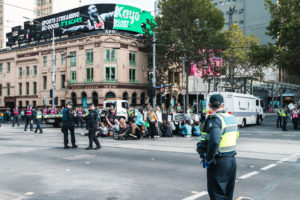This article is republished from The Conversation under a Creative Commons license. Author: Piero Moraro, Lecturer in Criminal Justice, Charles Sturt University.
 Thirty-nine people were arrested in Melbourne over an animal rights protest that blocked a major intersection. The protest caused chaos for commuters during the morning peak hour, and politicians and the media were quick to condemn the act.
Thirty-nine people were arrested in Melbourne over an animal rights protest that blocked a major intersection. The protest caused chaos for commuters during the morning peak hour, and politicians and the media were quick to condemn the act.
The prime minister denounced the “shameful, un-Australian” conduct of “green-collared criminals”. The opposition leader commented that protesters should thank farmers, rather than attack them. And some people on social media ridiculed and abused those engaged in the protest.
Yet Australia, like most liberal regimes, should allow citizens to protest as part of their right to free speech. Civil disobedience has traditionally played a positive role in democratic societies. Indeed, the label “civil” is meant to signal something praiseworthy in the protest.
Civil disobedience isn’t the same as non-violence
Civil disobedience is traditionally identified with the non-violent campaigns of Mahatma Gandhi and Martin Luther King junior. But as I explain in my book on this subject, this has had the unwelcome result of suggesting that “civil” means “non-violent”.
After 39 activists were arrested, Superintendent David Clayton explained yesterday that Victoria Police:
…respect the right of people to protest peacefully.
This statement suggests the Melbourne protest was not peaceful, despite the fact protesters were holding placards that read:
This is a peaceful protest.
What many found despicable in this protest was the disruption of public traffic. They think the right to protest does not imply the right to cause others to remain stranded on their way to work. From this standpoint, the activists’ disruptive conduct constituted an act of violence and, as such, was incompatible with the principles of civil disobedience.
The danger of neutralising dissent
But this reasoning is misguided and dangerous. It’s dangerous because it risks neutralising the potential of civil disobedience as a form of dissent. When the government claims that only non-disruptive protests are “civil”, it’s also implying that those who seek to go beyond mere symbolic actions, and to have some impact on others through their protest, are censored as “criminal” and uncivil.
Sociologist Herbert Marcuse captured this risk with the notion of “repressive tolerance”. He argues that a government may successfully neutralise dissent by persuading citizens that there are “good” and “bad” ways of protesting. The good ones are those that cause no disruption, the bad ones are those that do – and citizens should engage in the good ones only.
But it is no coincidence that protests that cause no disruption are also the least likely to have an impact on public opinion and therefore force the government to take action.
This is exactly what occurred in Melbourne yesterday. After many non-disruptive protests that led to no answer from the government, the activists resorted to a disruptive act to force society to face the moral issue of animal treatment in the food industry. This was necessary to ensure their view, for once, was not ignored by the public.
What civil disobedience is and isn’t
I describe civil disobedience as an act of communication (albeit illegal). It is a way for citizens to “persuade” others of the necessity of changing a law, policy of practice. Its civility lies in the fact it shows respect and consideration for those it addresses.
But this need not be done in strictly non-violent ways. For example, in some cases forcing others to face our opinion (even against their will) is not uncivil, insofar as they remain free to decide whether to endorse or reject our view.
The conduct becomes uncivil when it seeks to “coerce” others to accept one’s view – for example, via threats. This is why terrorism is inherently uncivil.
Many people defended Edward Snowden’s whistleblowing as a form of civil disobedience, since he claimed to have leaked classified documents to the public “so what affects all of us can be discussed by all of us in the light of day”.
The same could be said of the Melbourne protest. One of the protesters explained:
All we want is for people to watch the documentary and understand what goes on in Australian abattoirs.
The protesters sought to persuade others to take action to promote animal welfare, not coerce them.
Of course, these activists resorted to an illegal act to carry out their protest, and for that reason they may be answerable to the law. Yet, I would argue, as civil “disobedients”, they should be treated with more leniency in comparison to standard lawbreakers.
Not all peaceful protest is civil
There is another important reason why we should resist the idea of civility as synonymous with non-violence. When right-wing groups decide to organise a peaceful protest in support of their racist views, their action may certainly be described as “non-violent”, insofar as it causes neither injury no disruption to others.
But this protest could never be considered “civil”, despite its non-disruptive nature, because at its heart lies an inherent disrespect for some segments of society.
Claiming that some people are less worthy than others, simply because they belong to a certain race or religion, is inherently uncivil. Those who engage in protest, even non-violent ones, to advance those claims should appropriately be condemned as uncivil disobedients.

